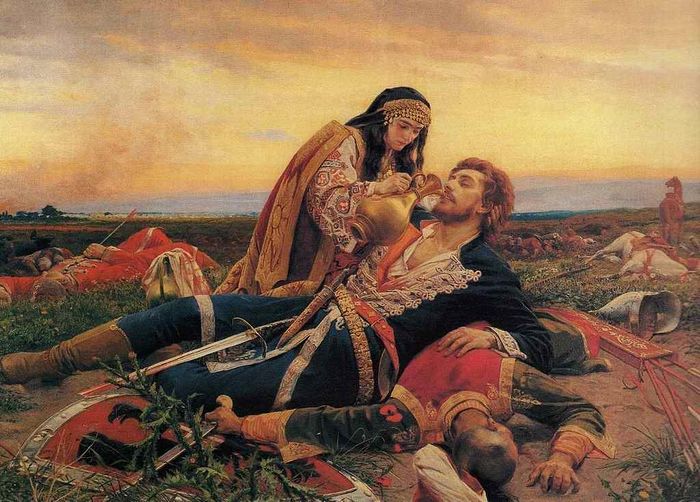 The Kosovo Maidan — An iconic Serbian painting of a woman looking for her love among the dead and wounded after the battle of Kosovo. Photo: Wikipedia
The Kosovo Maidan — An iconic Serbian painting of a woman looking for her love among the dead and wounded after the battle of Kosovo. Photo: Wikipedia
A U.S. general views the influence of the Serbian Orthodox Church in Serbia as a problem for the USA and the West.
The former Commander of U.S. Army Europe, General Ben Hodges, alleged in an article that “Moscow” is “applying pressure through the [Orthodox] clergy” in Serbia. This was in connection with the heated situation between Serbia and Kosovo, the latter being the traditional heart of Orthodox Serbia, which after the NATO invasion, the West has been pressuring Serbia to recognize as a state.
This essentially furthers the unfounded Western narrative that Russia is somehow destabilizing other nations. In particular, there is a part of this narrative that the Orthodox Church, in particular, the Russian Orthodox Church, is a tool of the Kremlin, and a threat to the USA.
Ironically, that specific narrative first emerged during the shady relationship between the Ecumenical Patriarchate and the U.S. Government under Patriarch Athenagoras and President Truman. President Truman viewed the Ecumenical Patriarchate as both an influential partner “in the furtherance of U.S. international interests”, as well as “a means to foil Moscow’s politically-driven efforts to project the Church of Russia as a global rival to Constantinople”.
With regard to Serbia and Kosovo, the situation is very complicated, however one thing is abundantly clear. If one objectively examines the effect of the NATO invasion and bombings, and Western support for Kosovo, it becomes obvious that the Western position directly attacked and weakened the well-being of Orthodoxy in the Balkans, to the benefit of Moslems. History only further serves to illustrate why Serbian Christians are so defensive of Kosovo.
Kosovo is to Serbia what Kiev is to Russia, or Constantinople is to Greece; it is the spiritual heart and homeland of Serbian Orthodoxy, home to some of its greatest shrines and most important saints and events. It would not be an exaggeration to say, paraphrasing the words of the Serbian Patriarch, that there is no Serbia without Kosovo.
What exactly happened here? In Kosovo all Christians can learn a great lesson, because here the Serbs celebrate one of their greatest heroes, the ethno-martyr and Tsar St. Lazar, as well as the legendary Battle of Kosovo fields, commemorated on Vidovdan, or the day of St. Vitus.
The Battle of Kosovo was a great victory of the Serbian people, which resulted in the death of their king and great hero, the sundering of their lands, the mass slaughter of their people, and the almost total annihilation of Serbia as an independent state. And yes, they call it a victory, and here is why:
On the fields of Kosovo, the people of Serbia had a choice, to win a spiritual battle, or a physical one.
To win glory for their nation and state, or crowns of martyrdom, and they chose the latter.
Tsar Lazar could have attempted to form a deal with the Ottoman Sultan, which could have spared both his life and his kingdom, but he understood that this would mean becoming the subject of a Moslem ruler, and it risked threatening the Serbian faith.
Instead, Tsar Lazar resolved that it was better to die a free Christian than to be slaves to Moslems. The Sultan also died in battle, along with the Serbian King, and both forces were nearly annihilated to the last, but for the massive Turkic horde, these numbers could be replenished, but for the tiny nation, they lost almost their entire army, and with it, their ability to militarily resist further invasions.
A part of Serbia may have died on that field, in a way, but this tiny nation died a colossus, remaining faithful to Christ. In exchange for their faithfulness, the Lord vouchsafed to preserve the Serbian people, and despite all the suffering and ruin they and their fellow Slavs experienced, Serbia never disappeared from the earth.
The Battle of Kosovo, and St. Lazar, is a lesson that winning the Kingdom of Heaven is worth dying in any earthly battle, and no victory on earth is worth losing your soul, but it is better for your body to die, and your soul to remain pure.
It is for this reason, and not petty nationalism, that Serbians love Kosovo, in addition to it being a center of their culture.
Serbia was for centuries, much like Ukraine, caught between Moslem and Catholic forces, especially Austro-Hungarians. The Russian Emperor Nicholas II always remembered the brotherhood of Russians and Serbs, and the Russian Empire entered WW1, even knowing how catastrophic it could be, to save their Serbian Orthodox Brothers.
It must never be forgotten that this most cataclysmic of wars for Russia, was fought, as the Poles would say “For our freedom and yours”, for the freedom of Serbs and Russians.
Serbia for the first time in centuries regained her historical lands in the 20th century, but then lost Kosovo again, this time, to the Western powers, which demanded Kosovo become independent after they bombed Serbia.
Now, in “democratic” Kosovo, attacks on Orthodox Churches are common occurrences which are rarely investigated by the Moslem authorities. These attacks also never make the mainstream news in the West, which is why most Western people don’t hear about them, and therefore don’t see Serbia as a victim here.
Still, to this day, Kosovo is the subject of many beautiful Serbian folk songs (some available with English subtitles), and was always held by Serbian saints as being Serbian land. Take for example this video of a young Serbian woman singing about Kosovo with a Russian tourist, and then singing the popular Russian spiritual anthem “Kon”.
It should be of no shock to anyone, that Russian Orthodox Christians support Serbian Orthodox Christians in defending the rights of their suffering Church in Kosovo. Still, this support is found at the most basic roots in the hearts and souls of Orthodox Christians, and in no way constitutes some sinister Russian plot to destabilize the Balkans.
Still, the Union of Orthodox Journalists wrote that the U.S. general views the Serbian Church as a threat to the USA in the region. The general was adamant that Russia is influencing the Serbian President not to recognize Kosovo via the clergy.
While it should not be a surprise, the fact that the Serbian Church does not support the initiative of a military alliance that bombed them — to recognize their heartland as a foreign, Moslem country, has nothing to do with Russian influence.
The Serbian Bishop of Zvornik and Tuzla Photius was quoted by the UOJ as saying: “We interfered with Napoleon and Hitler, and many others who were marching against Russia, and a similar scenario is unfolding at this stage. Now the balance of power in the world is such, that the West is coming together, and once again striking at the East, and we are in their way, and because of this we have suffered many times.”
Moreover, Bishop Photius believes that any rapprochement of Serbs with NATO is immoral: “Our people have already said that we will not be able to accept this, because we have survived the NATO bombing. Many of us were traumatized then, and it was definitely not moral.” The hierarch is also skeptical of the European Union.
Given the history we discussed, this should not be surprising, but the West often continues to act bewildered when nations they bomb, and whose cultural and religious values they attack, don’t wish to align with their interests.
A trend emerged of the United States advocating its foreign policy objectives in Orthodox countries—objectives that often contradict the traditional Orthodox worldview—and then when the local Church protests specific matters, such as liberal forces lobbying for gay parades, U.S. officials warn that this is the influence of the Kremlin.
In Georgia, for example, we reported on how a U.S. State Department official said:
Today our efforts are mainly directed to the cities of Georgia. But there are a lot of people in the country who do not use social media. The Orthodox Church for them is an indirect conductor of Russia’s influence. We must do more to explain to these people: The West is not indifferent to the traditions and beliefs of Georgian society. In the long run, it is necessary to win over Russia. We have a lot to do, but it is clear that the Georgian people have chosen the Western future, and they need help.
Given that the Serbian Orthodox Church has taken a very strong position of support for the canonical Ukrainian Orthodox Church, this likely furthers the hostile way Western powers view the Church, who have made it clear which party in the Ukrainian Church conflict they support.
If Orthodox people take a clear look at history and current events, it apparently becomes clear, however, which forces are constantly trying to sabotage them, and this naturally influences their relationships in the world.


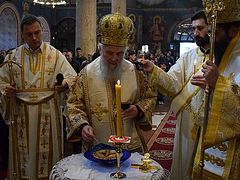
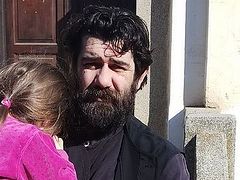
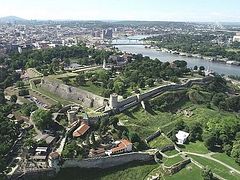
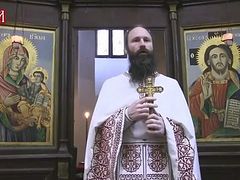
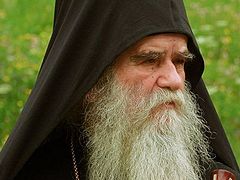
Laying aside Truman, and as to a broader, nuanced approach, while there is no doubt whatsoever that the godless authorities persecuted Orthodoxy, and the US was anti-communist, I don't think it can be argued in any way that NATO, for example, was fighting to liberate the Orthodox persecuted peoples. Certainly, if they could use them to their advantage, and leverage them in the fight, the US and their allies would have been happy to say they were fighting for persecuted Orthodox people, but this was not by any means their primary objective or even their concern.
Their concern was only advancing their geopolitical interests --- which is not their particular sin. Many conquerors in history tried to pass themselves off as liberators, and sometimes in conquering or defeating a political enemy, they actually did achieve the liberation of a certain people, but the primary goal was to win their battle.
For example, WW2 collaborationists actually tried to use the argument that the Bolsheviks were persecuting the church to encourage people to collaborate with the germans, the most famous example being the Vlasov and Bandera movement, but I am sure any westerner would agree, that just because Stalin was bad, that did NOT make Hitler good. We recognize that just because Hitler was fighting the same people persecuting the Church, this does not make Hitler a liberator of Christians, he remains a bloody tyrant because of the fruits of his actions.
Look directly at the fruits of the western powers? When they bombed Serbia and Syria, did these events lead to the benefit of Orthodox people? It is clear these events lead to the catastrophic ruin of many Orthodox communities, and to the direct benefit of the persecutors of the Orthodox. If the average Syrian Christian can tell you that those "moderate rebels" the West are supporting in Syria are terrorists, then it is impossible to believe the leaders of western countries don't know is protecting the Syrian Orthodox community, and who is attacking them. The same applies to Kosovo.
The Western globalist powers directly bring wars and destruction to Orthodox countries, and ally with countries or powers which persecute Christians directly or indirectly, like Saudi Arabia, all while lecturing about democracy.
The point of this article is a NATO General saying that he is worried Serbian Priests are telling Serbian people not to ally with NATO, the EU, and the West, but for example, to ally with Moscow?
Can you imagine a Russian general going to Canada and telling Canadians that he is concerned the people there are allied with America and not with Russia?
The issue is which global powers are directly weakening the welfare of Orthodox civilizations? Still, only the Devil is the enemy of mankind, not our fellow men